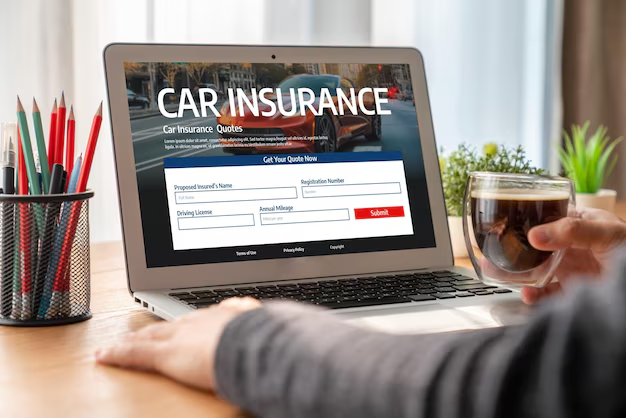Your Guide to Can You Pay Car Insurance With a Credit Card
What You Get:
Free Guide
Free, helpful information about Credit Cards FAQ and related Can You Pay Car Insurance With a Credit Card topics.
Helpful Information
Get clear and easy-to-understand details about Can You Pay Car Insurance With a Credit Card topics and resources.
Personalized Offers
Answer a few optional questions to receive offers or information related to Credit Cards FAQ. The survey is optional and not required to access your free guide.
How to Use a Credit Card to Pay for Car Insurance: A Complete Guide
Are you considering using a credit card to pay for your car insurance? Whether it's for the convenience, the benefits, or the necessity, paying insurance premiums with credit can be a strategic financial move for many. Let's dive into the options, pros and cons, and practical advice to manage this payment method effectively.
Why Consider Using a Credit Card for Car Insurance Payments?
Convenience and Flexibility
Paying your car insurance with a credit card can simplify your financial management by consolidating your expenses into one account. This can be especially useful for individuals who prefer a single monthly bill payment method or who want to automate their expenses.
Benefits and Rewards
Many credit cards offer incentives such as cashback, points, or travel rewards for every dollar spent. By using your credit card to pay for car insurance, you might be able to earn rewards that you can redeem in various ways.
Avoiding Lapsed Coverage
If you’re facing liquidity issues, paying with a credit card can prevent the lapse of your car insurance coverage. Maintaining continuous coverage is crucial not only for legal reasons but also to avoid rate hikes from providers.
Things to Consider Before Paying Car Insurance With Credit
Interest Rates and Fees
Before deciding, evaluate the interest rates on your credit card. If you don’t pay off the balance promptly each month, the interest could quickly outweigh any rewards gained. Similarly, confirm if your insurance provider charges a fee for credit card payments.
Credit Utilization Impact
Regularly using a significant portion of your credit card limit can affect your credit utilization ratio, impacting your credit score. Keeping utilization low is often viewed positively by credit scoring systems.
Billing Cycle Synchronization
Aligning your credit card billing cycle with your insurance payment schedule can help you manage cash flow more effectively, ensuring you have enough time to settle the balance before the due date.
How to Set Up Car Insurance Payments With a Credit Card
1. Contacting Your Insurance Provider
Not every insurance company accepts credit card payments or might have specific terms and conditions. Check with your provider to confirm if they allow credit card payments and inquire about any associated fees.
2. Set Up Automated Payments
To ensure that you never miss a payment, consider setting up an automatic payment. This adds another layer of convenience, ensuring your coverage remains intact.
3. Monitor Your Statements Regularly
Make it a habit to review your credit card statements regularly to catch any discrepancies or fraudulent charges. This is a good practice whether you’re paying car insurance or any other bills with your card.
Advantages of Using a Credit Card for Car Insurance
- Ease of Setup: Many insurers offer online portals for quick and easy credit card payment setups.
- Payment Tracking: Your credit card statement acts as an additional layer of record-keeping, simplifying end-of-year financial reviews.
- Short-term Financial Aid: In short-term financial crunches, a credit card can bridge the gap without disrupting essential aspects like car insurance coverage.
Disadvantages to Keep in Mind
- Potential Debt Accumulation: If not managed carefully, this can lead to accumulating debt.
- Possible Fees: Ensure you understand and factor in any convenience fees charged by your insurer.
- Higher Interest Obligations: If you’re unable to pay the card off quickly, interest rates could lead to increased financial obligations.
Tips for Maximizing Credit Card Use for Insurance Payments
- Choose a Card with Low-Interest Rates: For those who might carry a balance, a low-interest card can be a safer choice.
- Utilize Rewards and Cashback Programs: Maximize benefit potentials by using a card that gives you relevant perks for your lifestyle.
- Keep Track of Expiration Dates: Ensure your card has up-to-date information to prevent payment interruptions.
📝 Summary Snapshot
- 🌟 Convenience: Combine bills, simplify payments.
- 🎁 Rewards: Earn points/cashback on premiums.
- 🚀 Avoid Coverage Gaps: Use when cash flow is tight.
- ⚠️ Beware of Fees: Know your credit and insurer terms.
- 📅 Automate Payments: To prevent mistakes and protect credit score.
Car insurance is a necessary expense, and how you choose to pay it can have a meaningful impact on both your financial health and credit score. By understanding the potential benefits and pitfalls, setting informed priorities, and applying disciplined financial practices, paying car insurance with a credit card can be a beneficial aspect of your financial strategy. Just be sure to pay careful attention to rates, timing, and any applicable fees to make the most out of your decision.
What You Get:
Free Credit Cards FAQ Guide
Free, helpful information about Can You Pay Car Insurance With a Credit Card and related resources.

Helpful Information
Get clear, easy-to-understand details about Can You Pay Car Insurance With a Credit Card topics.

Optional Personalized Offers
Answer a few optional questions to see offers or information related to Credit Cards FAQ. Participation is not required to get your free guide.


Discover More
- a Credit Card
- Am Eagle Credit Card
- Are Airline Credit Cards Worth It
- Are Credit Card Points Taxable
- Are Credit Card Rewards Taxable
- Can a Credit Card Company Sue You
- Can a Debit Card Be Used As a Credit Card
- Can a Money Order Be Paid With a Credit Card
- Can a Secured Credit Card Build Credit
- Can Credit Card Companies Garnish Your Wages
